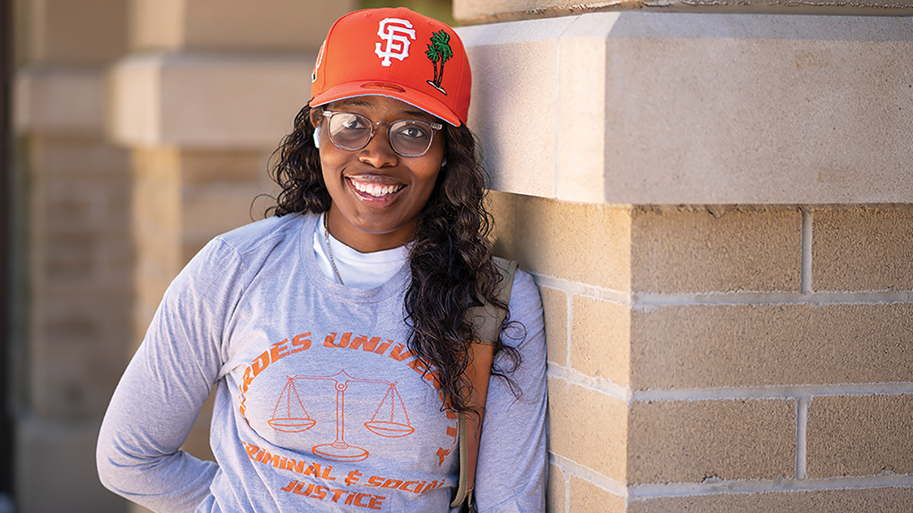Graduates with bachelor’s degrees in criminal and social justice and social work can gain employment in the public and private sectors as probation and parole officers, juvenile justice counselors, and social workers. With the increased demand for healthcare and social services, the U.S. Bureau of Labor Statistics projects faster employment growth for social workers than the average for all occupations.

Criminal and Social Justice/Social Work Dual Major
Bachelor of Arts
Individuals can achieve their Bachelor of Arts degree with a dual criminal and social justice and social work major. Many students choose a double major to strengthen employment opportunities, provide advanced standing for graduate study programs, and save money while pursuing a master’s degree.
Depending on the school attended, graduates earning a degree in criminal justice and social work can expect to achieve their master’s degree up to a year sooner. Lourdes graduates with this distinctive bachelor’s degree can choose to achieve their Master of Social Work degree in just 39 credit hours rather than the required 57 credit hours for those with non-advanced standing.
Plan of Study
CRIMINAL JUSTICE AND SOCIAL WORKDUAL MAJOR |
|
|
128-130 Total Credit hours |
|
|
(Must obtain all credit hours, maintain a 2.0 cumulative GPA, pass all CJ courses with a C or above and maintain a 2.5 cumulative GPA in both CJ and SWK courses) |
|
REQUIRED CURRICULUMCore and General Education Requirements |
|
|
LUC 101 College Connections |
3 |
|
LUC 102 (Use SWK 205- Counted in major) |
x |
|
ENG 101 Composition 1 |
3 |
|
MATH (must take MTH 212 Statistics) |
3 |
|
ETHICS (completed in major with SWK 360/ CJS 360 in major below) |
x |
|
Enduring Question Course |
3 |
|
Cultural Awareness (*Choice of CSJ 304 MCD or SWK 209 Multicultural Perspectives) |
3 |
|
ENG 200 Literature |
3 |
|
ENG 313, 351, 352, 355 (choose 1) |
3 |
|
History |
3 |
|
Philosophy (suggest PHL 102 Critical Thinking) |
3 |
|
Theology |
3 |
|
Theology |
3 |
|
Fine Arts (art, music, theater) |
3 |
|
Science (*Choice of BIO 204, 207, 212, or 319) |
3 |
|
Social Science (Must take PSY 110) |
3
|
|
Allied and other required courses |
|
|
PLS 122 American National Govt |
3 |
|
COM 100/102 Oral or Interpersonal Communications |
3 |
|
BUS 251 Economic and Social Issues |
3 |
|
CSJ 327 Social Science Research or SWK 413 Practice Oriented Research |
3 |
|
PSY 110 Intro to PSY (counted in Gen ed) |
x |
|
CSJ 101 Intro to SOC (counted in major) |
x
|
|
Criminal and Social Justice Courses |
|
|
CSJ 101 Intro to Sociology |
3 |
|
CSJ 102 Intro to Criminal Justice |
3 |
|
CSJ 205 Juvenile Delinquency |
3 |
|
CSJ 210 Criminology |
3 |
|
CSJ 213 Criminal Investigation |
3 |
|
CSJ 218 Community Corrections |
3 |
|
CSJ 307 Penology |
3 |
| CSJ 325 Victimology | 3 |
|
CSJ 331 Criminal Law and Procedure |
3 |
|
CSJ 444 Constitutional Law |
3 |
| Social Work Courses | |
| SWK 111 Intro to Social Work (pass with B- or above) | 3 |
| SWK 205 Pre-Professional Seminar (pass with B- or above) | 3 |
| SWK 210 Human Behavior I | 3 |
| SWK 310 Human Behavior II | |
| SWK 311 Social Work Progress I | 3 |
| SWK 312 Social Welfare System | 3 |
| SWK 360/ CSJ 360 Ethical Decision-Making | 3 |
| SWK 411 Social Work Progress II | 3 |
| SWK 412 Contemporary Soc. Welfare | 3 |
| SWK 418 Social Work Process III | 3 |
|
SWK 490 Field Placement I |
4 |
|
SWK 490 Field Placement II |
4 |
|
SWK 492 Field Placement Seminar I |
2 |
|
SWK 492 Field Placement Seminar II |
2 |
Learning Outcomes
SOCIAL WORK LEARNING OUTCOMES
Social Work education at Lourdes University aims to prepare competent and effective professionals who will work to enhance the social functioning and interaction of individuals, families, and groups.
The Social Work Program at Lourdes University provides students with a generalist practice curriculum based on professional standards and in collaboration with a liberal arts education. The program includes a curriculum that builds on the liberal arts perspective, promoting breadth of knowledge, critical thinking, and communication skills.
- The program advances the knowledge, values, and skills essential to any social worker’s practice.
- Students receive a well-integrated body of knowledge, including bio-psycho-social and spiritual assessment training.
- Students learn to apply the knowledge and skills of a generalist social work practice with diverse and at-risk populations.
- The program prepares students to use theoretical frameworks and research strategies to evaluate the process and effectiveness of social work practice.
A significant focus of the program is the enhancement of human well-being to alleviate poverty, oppression, and other forms of social injustice. Students prepare to practice without discrimination and apply advocacy and social change strategies that advance social and economic justice.
CRIMINAL JUSTICE LEARNING OUTCOMES
- Students will understand basic sociological concepts and theories and their relationship to the institutions of social control.
- Students will be able to demonstrate knowledge of the administration of law enforcement agencies, adult and juvenile court systems, corrections policies, policing, philosophies of crime and punishment, and theories of deviance.
- Students will express themselves clearly and coherently and be able to discuss, in written and oral form, issues related to law enforcement and the provision of justice in society.
- Students will demonstrate the ability to apply ethical principles to the administration of justice.
- Students will demonstrate an understanding of the multicultural nature of society and the implications of societal diversity for the justice system.
SOCIOLOGY LEARNING OUTCOMES
Basic Sociological Concepts & Theory
1. Students will understand basic concepts in sociology so that they will be able to:
-
- Define, give examples, and demonstrate an understanding of sociological concepts and theories.
- Demonstrate the ability to apply sociological concepts and theories.
- Express ideas clearly and coherently in writing and oral presentations.
Basic Research Competence
2. Students will understand the role of evidence in sociology, such that they will be able to:
-
- Identify basic methodological approaches and describe the general role of methods in building sociological knowledge.
- Compare and contrast the basic methodological approaches for gathering data.
- Complete components of a research study and explain various decisions.
Cultural and Global Diversity
3. Students will understand the diversity of American society and its place in the international context such that they will be able to:
-
- Describe the significance of variations by race, ethnicity, class, gender, age, sexual orientation, and other culturally relevant categories in human relations.
- Compare and contrast the basic methodological approaches for gathering data.
- Describe the social factors and processes through which prejudice and discrimination are created and perpetrated.

